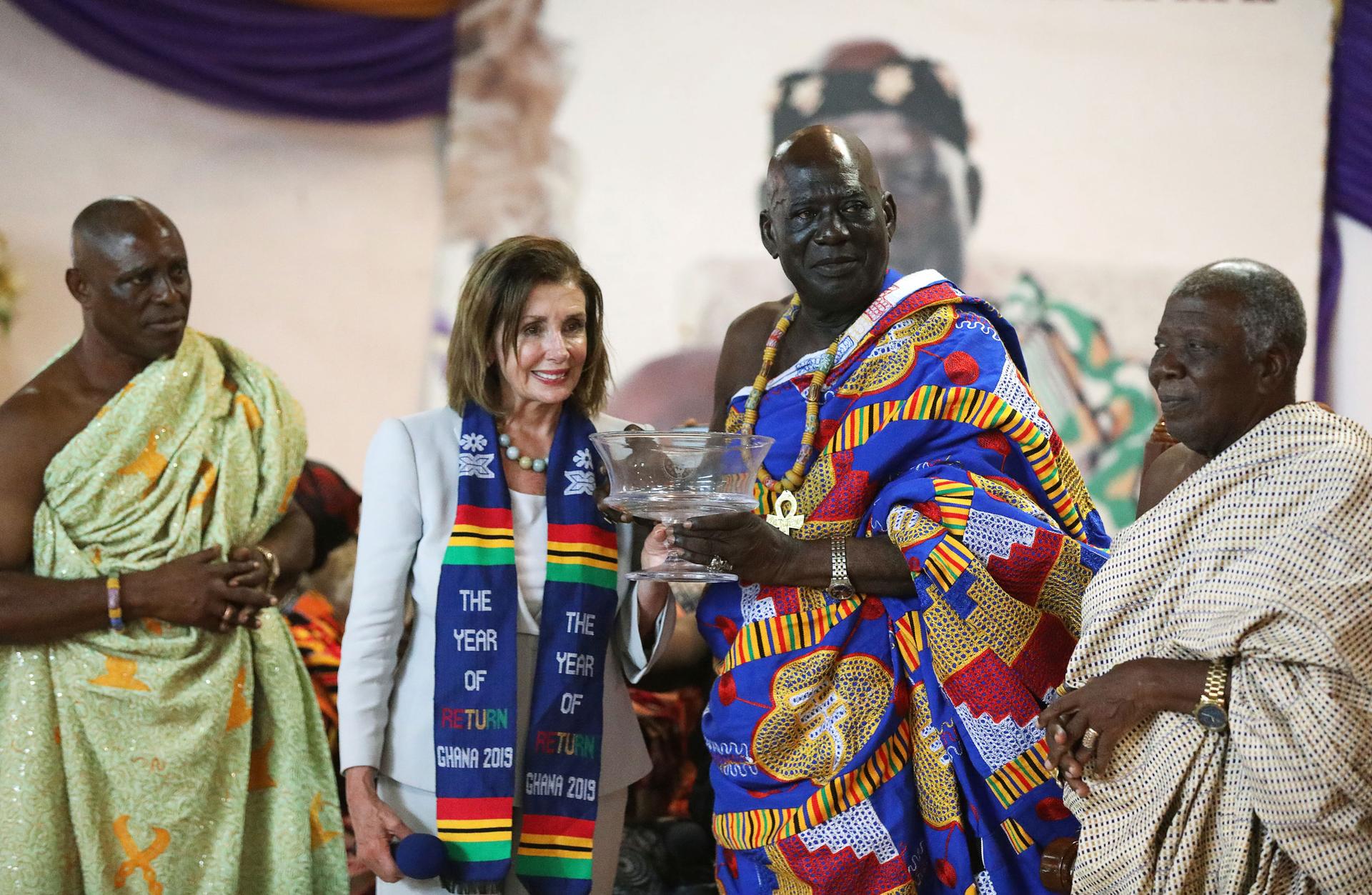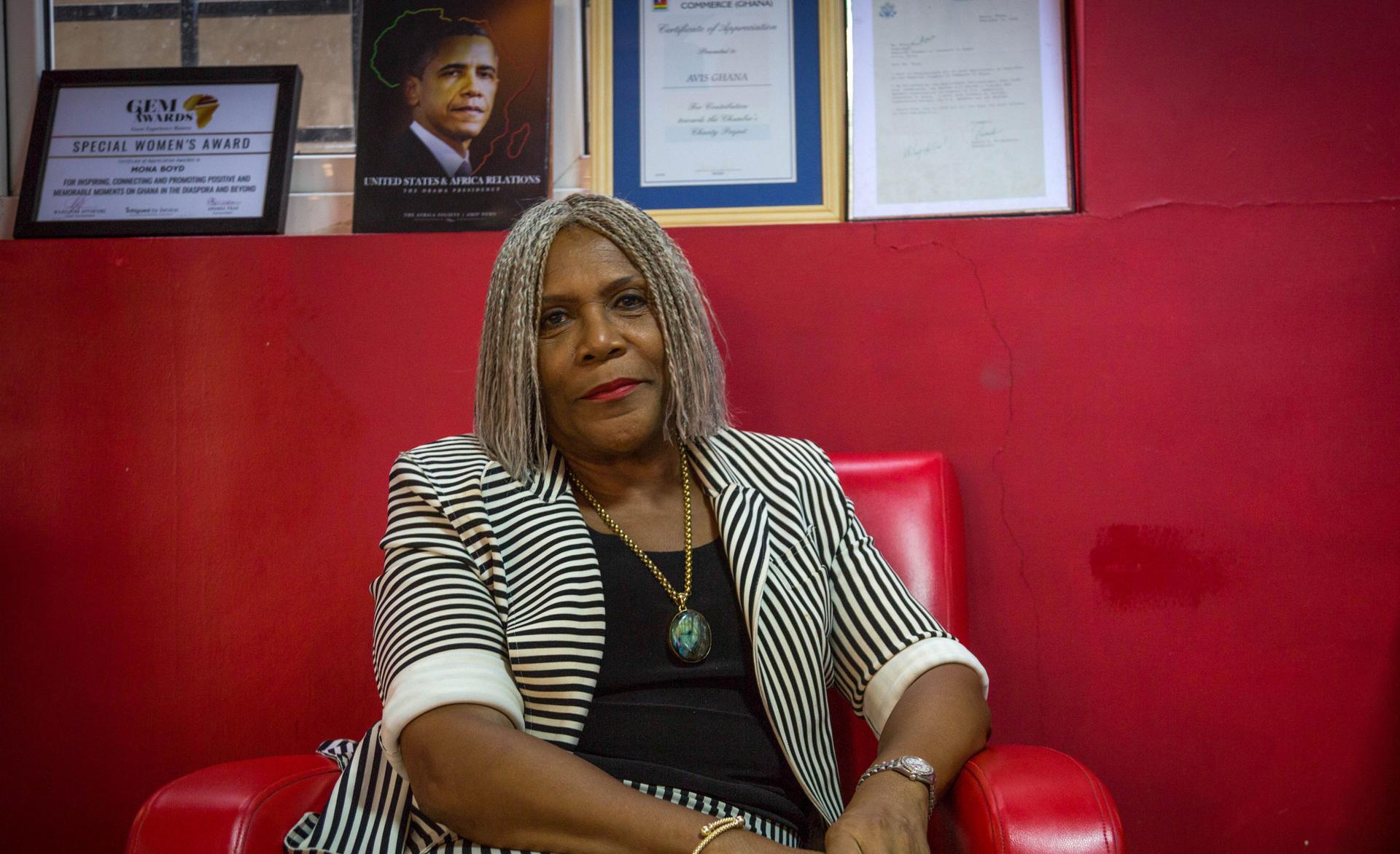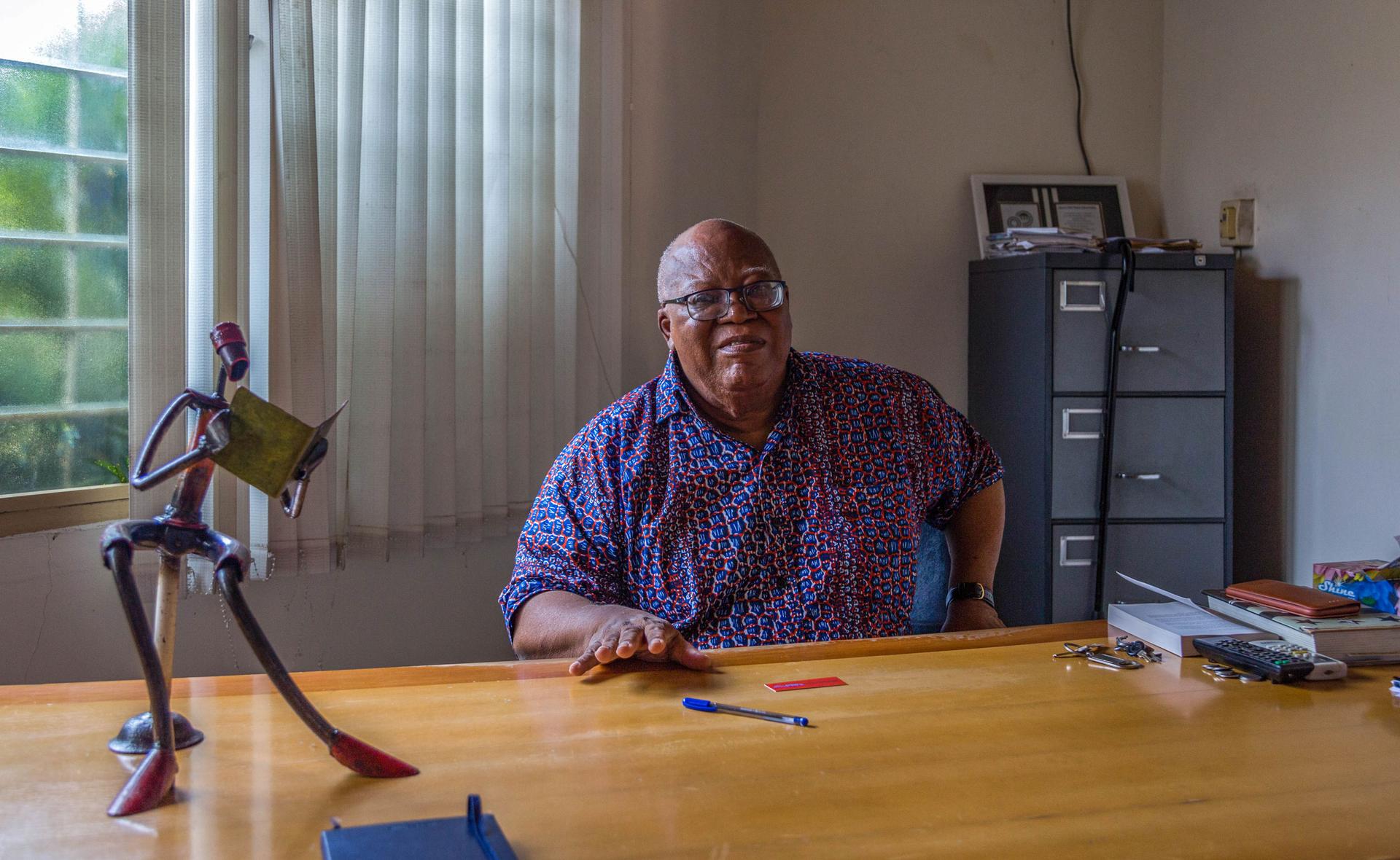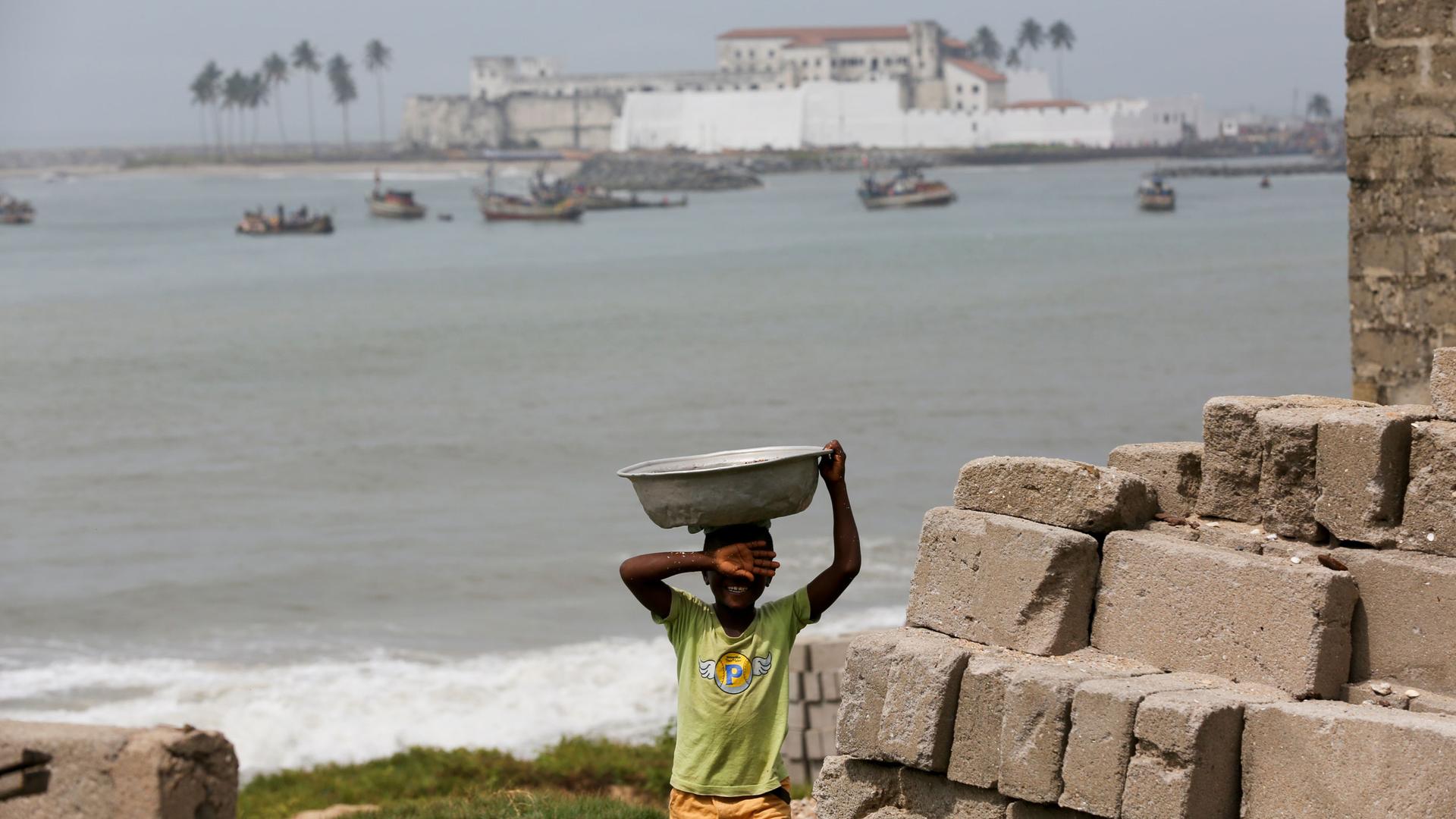‘Willful amnesia’: How Africans forgot — and remembered — their role in the slave trade
Ghana has declared a “Year of Return” for African descendants around the world to mark 400 years since the first Africans were enslaved in what would become the US. In a huge tourism push, the country has brought in celebrities from Idris Elba and Naomi Campbell to US House Speaker Nancy Pelosi and 12 members of the Congressional Black Caucus.
“It’s sort of like — I wouldn’t call it mitigation, but it’s just an acknowledgment: ‘Yes, this did happen, and you’re not crazy for thinking that this awful thing happened. It did happen.’”
“I just couldn’t believe [Nancy Pelosi] was coming because I think it’s important,” said Mona Boyd, one of the event organizers in Ghana. “It’s sort of like — I wouldn’t call it mitigation, but it’s just an acknowledgment: ‘Yes, this did happen, and you’re not crazy for thinking that this awful thing happened. It did happen.’”
Related: A professor with Ghanaian roots unearths a slave castle’s history — and her own
The slave trade changed the lives of millions of Africans and their descendants. But Boyd’s whole life, she felt like people had denied that it took place because they never talked about it. The focus had always been on moving on.

Maybe because it had to be. Boyd grew up in segregated Arkansas under Jim Crow laws. She remembers her parents whispering about lynchings in the kitchen early in the mornings, thinking she couldn’t hear.
In sixth grade, though, she learned that there was another place where people who looked like her lived in pride, not fear. Some visitors from Tanzania came to her nearly all-black school.
“This was like, wow,” Boyd said. “For us, it was like meeting the queen.”
Related: Slavers in the family: What a castle in Accra reveals about Ghana’s history
Boyd has been drawn to Africa ever since that day.
“Most African Americans know something is missing, and you want to be reunited with it. If you have any level of awareness about your own identity, where you came from, you would have to start asking those questions.”
“Most African Americans know something is missing, and you want to be reunited with it,” she said. “If you have any level of awareness about your own identity, where you came from, you would have to start asking those questions.”

Boyd, who lives in Accra, Ghana’s capital, is something of an expert on this. She used to be president of the African American Association of Ghana, and she owns a tourism business for African Americans traveling to Ghana.
“Some African Americans, they have a different mindset about, you know, Africans. They think there is a much deeper brotherhood than what I think,” she said. “That’s just my opinion right now. I don’t really see the deep brotherhood that some of them think. But we all have a right to handle this in our own way.”
Related: Resistance and collaboration: Asameni and the keys to Christiansborg Castle in Accra
And she’s seen many times how powerful the experience can be for people — standing in the same place as their last ancestor to leave this continent.
“You just don’t know what’s going to happen once they get that emotional,” she said. “We’ve had people have mental breaks.”
It’s a tough history to confront.
“There is a willful amnesia about the roles that we played in the slave trade.”
“There is a willful amnesia about the roles that we played in the slave trade,” said Nat Amarteifio, a local historian who’s also a former mayor of Accra, Ghana’s capital.
He explained that when the trans-Atlantic slave trade began, leaders in this region had a lot of gold, and word got back to the Europeans. In the 1400s, the Portuguese showed up here with guns.
“Primitive guns, but guns,” Amarteifio said. “With guns, you had a vastly superior form of intimidation. It made a hell of a difference.”
Related: Pirates brought enslaved Africans to Virginia’s shores. Where, exactly, is debatable.
They named the area the Gold Coast. There was already a domestic slave trade when they arrived, Amarteifio said, although slavery didn’t mean what it came to mean in America. Enslaved people had some rights and opportunities.
Still, “The system already existed,” Amarteifio said. “The Europeans saw it. And thought: ‘Ah, we can try these people in our lands in the New World.’”
But Amarteifio says the Europeans weren’t going out and capturing Africans. They couldn’t — they got sick and died from illnesses like malaria. Some African ethnic groups went into business, warring with other groups so they could capture prisoners they sold as slaves to the Europeans. Amarteifio says they were organized and intentional about it.
“To pursue slavery successfully, you need a highly organized group because somebody has to go out there — somebody has to locate the victims; somebody has to lead an army there; somebody has to capture them, transport them to the selling centers; all the time, keeping an eye on them to make sure they don’t revolt,” he said. “And then sell them, and move on.”

Anyone could be captured and taken. Eventually, the Portuguese were replaced by the Dutch, then the British in Ghana. Then, around the world came the abolitionist movement, the French Revolution, and increasing slave revolts, all spreading ideas about equality and humanity.
“When slavery was abolished, it was a result of long negotiations with slave owners in Europe as well as slave owners here,” Amarteifio said. “The big slave-holding nations also demanded repayment.”
The British went from being at the center of the slave trade in Ghana to — after abolition — patrolling the coast to make sure no illegal slave ships got by. They made treaties with African chiefs to protect them from other ethnic groups in a series of wars. Amarteifio says the British used those agreements to eventually declare themselves the colonial rulers.
Related: In search of refuge during the American Revolution, this enslaved black man joined the British army
“They hoisted the flag and declared they were now sovereign,” he said.
It was 1874. During British rule, Amarteifio says the African role in the slave trade was deliberately forgotten.
“The chiefs and peoples decided, ‘All right, we will not talk about it.’ They created a mythology that we were innocent bystanders whose land was raped by Europeans.”
“The chiefs and peoples decided, ‘All right, we will not talk about it,’” he said. “They created a mythology that we were innocent bystanders whose land was raped by Europeans.”
The British ruled for 80 years. In 1957, Ghana became the first sub-Saharan African country to break away from colonial powers and declare independence. It was the height of the US civil rights movement. Martin Luther King Jr. spoke at Ghana’s first independence day.
“In the US, we must solve this problem of racial injustice if we expect to maintain our leadership in the world, if we expect to serve as a moral voice in a world that is two-thirds colored,” King said after he returned.
African Americans started to travel to Ghana. Amarteifio was in his first year in college. He and some friends were asked to serve as guides.
“Naturally, we were recruited to take them around to tourist sites. So, I remember when they asked us, ‘So, who was sold?’ We said, “Only the bad people — thieves and drunkards,”” Amarteifio said. “I mean, we’re 19, 20 years old.”
They were just making it up because they didn’t actually know what had happened.
Related: Amid 1619 anniversary, Virginia grapples with history of slavery in America
“Especially since the history had never really been taught. And what history was taught was very sanitized. It was a disaster,” Amarteifio said. “A lot of African Americans were very disappointed to find this kind of blasé attitude.”
This is about the time Boyd first came to Africa. She had just graduated as part of one of the first classes of African Americans at Boston College after the US civil rights movement.
“Most Africans, when I came to this country, would not admit that [the slave trade] even happened,” Boyd said.
But that was overshadowed by the personal experience she had visiting slave castles.
“We were constantly — my generation — trying to prove to white people that we were good and we were smart enough that we deserved to be there,” she said. “But after I had gone through those castles, I didn’t care what you thought. You just couldn’t define me anymore … after I saw what had happened, I just felt like I am from an incredible group of people. We not only survived, we fought and we thrived. You know, and it made me feel so proud. A kind of proudness I’d never felt before.”
Boyd went back to Boston and met her Ghanaian husband, Eric Kuma Kumahia, at one of her professor’s parties. She went into real estate. He was in information technology. Soon, they were both making six-figure salaries, living in a brownstone in Boston’s historic South End where they could walk to the symphony.
Related: Archivists race to digitize slavery records before the history is lost
“We were trying to get pregnant when the Rodney King thing happened,” Boyd said.
It was 1991. She remembers watching that video of Los Angeles police beating Rodney King after a traffic stop. The police officers were acquitted, spurring race riots and civil unrest in LA.
“And I remember I was weeping, weeping, weeping, and I said to my husband, ‘I’m not going to get pregnant if you don’t agree to move back to Africa to raise our son. Why should we raise our son here when our son can go to your country where he will not be marginalized in any way?’” Boyd said.
Her husband agreed. Their son, Selasi Boyd Kumahia, was born later that year. Ghana was emerging from a period of repeated military coups. Boyd and her husband waited until the country had a successful democratic election. They moved when their son was 18 months old.
Related: Brazil’s first transgender Afro Brazilian lawmaker says she’s a ‘rebuke’ to the country’s history
“It was a gift to him because we gave up a lot,” Boyd said. “I do think if I had a girl, I wouldn’t be here [in Ghana] today.”
They didn’t really know what they were going to do in Ghana. They ended up in the independent car rental business. Boyd found working in Ghana liberating.
“I was able to let go of that conscious thought about race. It was like having a psychic burden taken off of your shoulders, and you could just move.”
“I was able to let go of that conscious thought about race,” Boyd said. “It was like having a psychic burden taken off of your shoulders, and you could just move.”
She didn’t realize she had more of that psychic burden to shed until a few years later. In 1994, then-Ghanaian President Jerry Rawlings apologized for the African role in slavery. Other leaders and chiefs slowly followed Rawlings and gave their own apologies.
“And it just made me feel so much better,” Boyd said. “I stopped feeling resentful, you know, towards Africans about slavery.”
Now, contemplating retirement, Boyd has decided she wants to make a lasting change in Ghana by adding to the small number of Ghanaian business owners. She’s going to pass on her business to a colleague she trained, Mawuli Dzebu.
Related: The slave-trade roots of US private prisons
Together, they’ve made her tour company, Landtours Ghana Limited, one of the most successful of its kind in Ghana, in part by offering trips aimed at helping African Americans reconcile with history, and heal.
“It’s a very emotional thing that we do because for the first time, Africans are saying to African descendants of the slaves: ‘We’re sorry. Forgive us,’” Boyd said.
They take tourists to the village of Salaga, which used to be a notorious slave market, where local chiefs have arranged to hold culturally authentic atonement ceremonies. She thinks they’re necessary.
Otherwise, “You can just never clear this up,” Boyd said. “You have people hating each other for centuries and killing each other basically because there’s no reconciliation.”
African elders wash the visitors’ feet. They eat together. Black Americans get African names. There’s drumming and dancing. This year, 118 people are going through the process.
“They understand what happened to black people — what black people lost. What they took,” Boyd said. “The brightest, the best, the strongest from this continent, you know. So, what would have happened if half of those people had not left this continent — what would this continent be like?”
Maybe in a way, they’ll find out now, if more African descendants around the world follow Boyd’s path. Her son has chosen to stay in Ghana and pursue a career in music producing, even though his mother would’ve preferred him to go to the US after college.
“I thought he would have a better opportunity,” Boyd said. “And he said to me, ‘Nope, I am not going back there. I do not want to live in a country where they put 30% of the men that look like me in jail.’”
The reason Boyd came to Ghana 30 years ago is the same reason her son is staying put now. Four centuries after the first captive Africans were taken from their continent and enslaved in the Colony of Virginia, the US still isn’t a place Boyd’s family wants to be.
Correction: An earlier version of this story incorrectly said Ghana was the first African country to break from colonial powers. It was the first sub-Saharan African country to do so.
